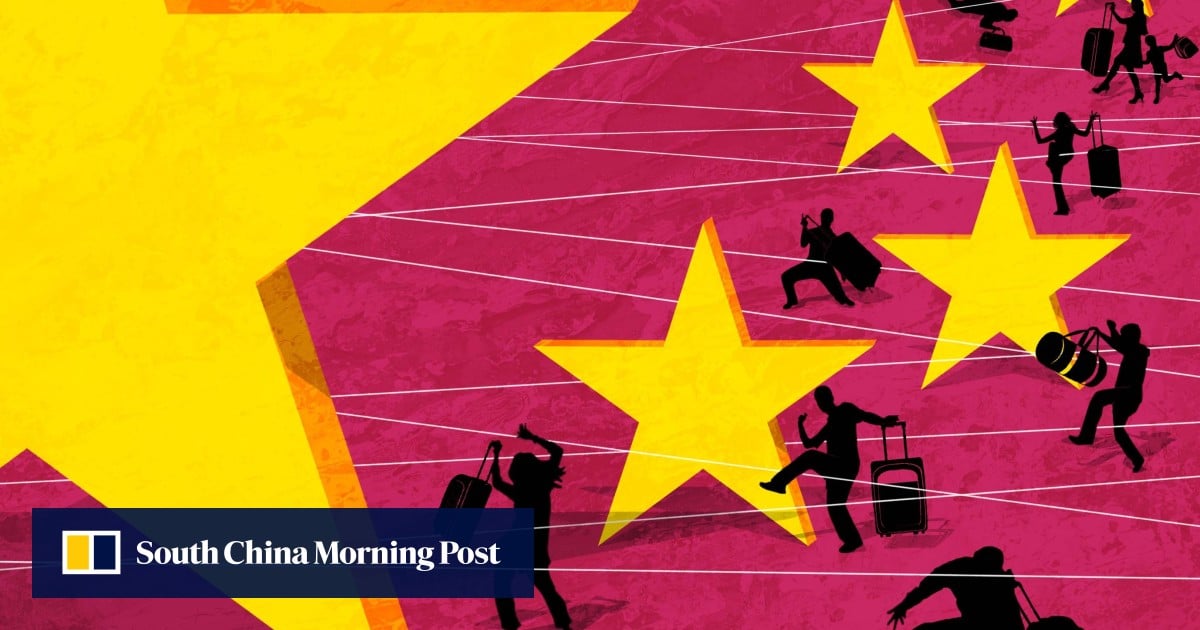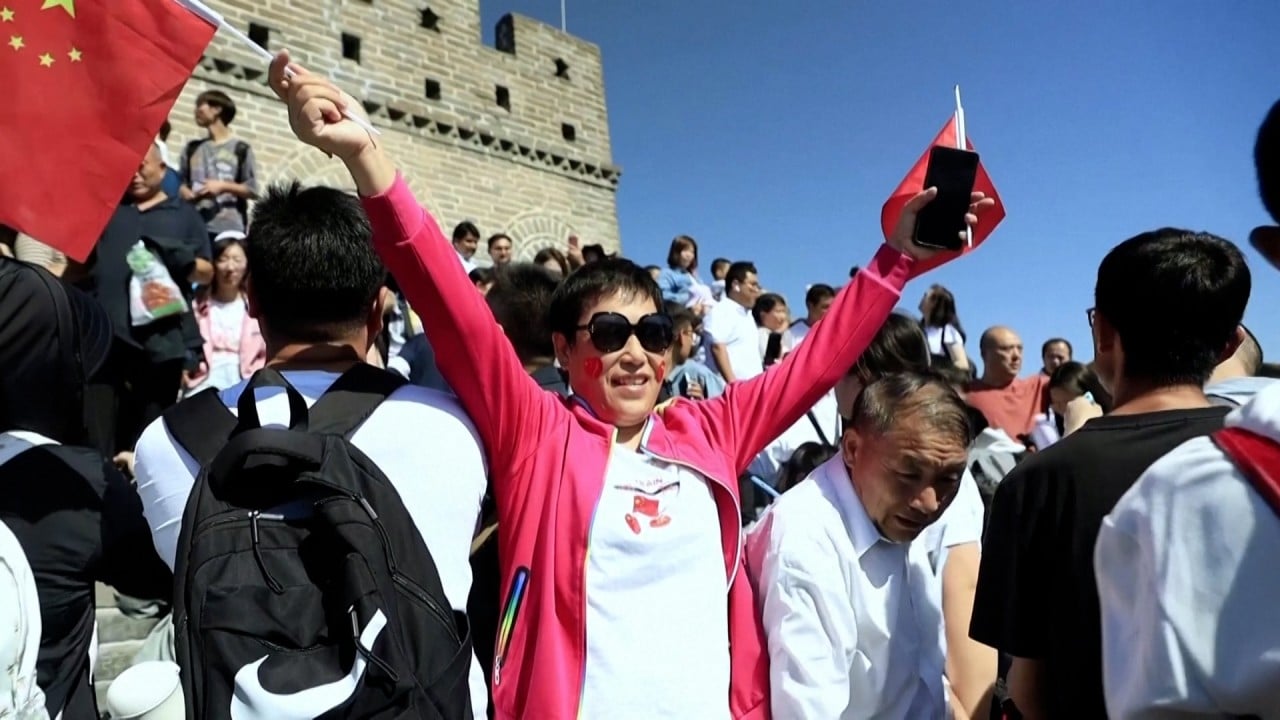During the weeklong Lunar New Year holiday in February, China recorded 3.23 million tourism-related entries, roughly the same as the festival period in 2019, the official Xinhua News Agency said in February.
The number of tourists from those countries – now 11 in Europe and three in Southeast Asia – “has increased significantly”, Xinhua said, citing figures stating their Lunar New Year arrivals were double those of the same period in 2019.
Previously, it was better to go on holiday in Thailand, [or] the Philippines … Now the situation is different
One country recently granted visa-free travel privileges is France, and for the 20,000 French nationals staying in Hong Kong, mainland China has never been more attractive.
“It’s just easy to go for one day or a weekend,” said Marc Guyon, one of that number who is making use of the new policy.
“Previously, it was better to go on holiday in Thailand, the Philippines or Taiwan rather than [mainland] China. Now the situation is different.”
Xinhua said last month that tourism was “accelerating recovery and development” in China, which needs sources of growth as it attempts to reverse unemployment trends, manage a housing crisis and jolt domestic consumption.
The country is also rapidly returning to a pre-pandemic level of connectivity. Direct flights linking China to other countries numbered 4,782 per week as of December, up from less than 500 at the beginning of last year, the nation’s civil aviation authority said.
Reciprocal visa waiver policies between China and other nations have led to an increase in international flights, and airline competition has sparked a “rationalisation of airfare prices”, Chinese travel platform Fliggy said in an email.
“Late 2023 saw rising interest in China as a tourist destination among Europeans, particularly from countries benefiting from the relaxed visa rules,” said Zoey Wang, global infrastructure ratings director with Fitch Ratings.
Beijing has “cut some of the red tape” for American visa applicants, “but it’s not enough to offset prevailing negative attitudes” about China, said Douglas Barry, a Washington-based consultant who follows US-China trade. Tens of millions of Americans travel abroad every year.
A US government advisory, issued in June and still in effect, urges Americans to “reconsider travel to mainland China”. It cited “arbitrary enforcement of local laws”, including those related to exit bans, and the “risk of wrongful detentions”.
Changing the attitudes of American travellers, Barry said, “will require a more concerted effort on the part of both countries” after years of edgy relations.
“Negative opinion surveys about China and a slowdown in business travel have made it hard for airlines to fill seats,” he said.
“Payment problems, visa problems, those are long-standing issues,” said James Chin, a professor of Asian studies at the University of Tasmania.
“I don’t think the tourism thing will change until [those barriers] fully open.”
China’s two dominant platforms, Alipay and WeChat Pay, have taken steps to make it easier for foreign travellers to pay for goods and services. Alipay has raised the single-transaction limit to US$5,000, five times the previous maximum.
These were smart kids … but even they had a hard time penetrating China’s digital economy
Guilin-based online travel agency China Highlights found in a survey that 68 per cent of inbound travellers can “successfully” use a Chinese mobile payment service. Of those that failed, the survey said, half reported rejection by a foreign bank or credit card.
Chetwynd, of the University of San Francisco, travelled with seven peers for an academic conference in Ningbo and company visits in Shanghai.
They all struggled to make their mobile payments work through US banks, group leader and university executive in residence Ker Gibbs said.
“These were smart kids who knew how to figure things out, but even they had a hard time penetrating China’s digital economy,” Gibbs said.
“For my students [here] last summer, it wasn’t easy to book a rideshare car or pay for a cup of coffee.”

Foreigners visiting on behalf of a multinational generally ask China-based assistants to help them process payments, he noted.
The China Hospitality Association trade group has instructed lodging operators throughout the country to “raise their internationalisation levels” by making foreign bank card payments more convenient and “improving the management of cross-border reservation channels”, the Workers’ Daily reported last week.
Airports in Beijing and Shanghai sell phone cards that allow e-payments, but they take “a long time” to install, said Steven Zhao, CEO of China Highlights. Some overseas travellers procure eSIM cards before their trips, he added.
Some travellers cannot access the likes of Gmail, Facebook or Instagram, which are popular offshore but banned in China – another hindrance for potential visitors.
“This has always been a big source of trouble,” Zhao said. “However, VPNs are very mature,” he said, referring to virtual private networks. “Many visitors who mind will basically buy a VPN suite online before they come to China.”
Chetwynd bought a short-term international service package from his American mobile provider, creating a personal hotspot for places where Chinese Wi-fi did not allow VPN use.
“Even as tourists come back to China, when those travellers hit the ground they are going to be confronted with a number of different challenges that are going to weigh on their experience,” said Nick Marro, lead analyst for global trade with the Economist Intelligence Unit.
“This doesn’t mean those challenges are insurmountable, but it means there are layers you need to think about when going into the Chinese market.”
Chinese travellers put Covid in rear-view as tourism revenues defy predictions
Chinese travellers put Covid in rear-view as tourism revenues defy predictions
Even with all the hassles, Chetwynd found his first China trip worthwhile. He presented research on climate change at the conference, and saw a slice of Shanghai nightlife. “It was an amazing time for me,” he said.
Adrien Grosclaude of France echoed those sentiments, saying he would go back to China despite the obstacles he faced during his travels in December and January.
The 22-year-old university student tried to buy a jacket in a Shenzhen outlet store but could not activate any mobile payment apps.
He went to a VIP service counter on the mall’s top floor for help – and was told to use cash. This required him to go to an outside ATM, lengthening the payment process to about an hour.
Because of “the stress” involved in dashing out to get cash, he said, he left his bank card behind – but the branch staff set it aside and returned it to him later.
[The issues] wouldn’t really deter me, but if I were to travel alone, it would be more complicated
After that experience, his Chinese companions, whom he had met during an exchange semester at the University of Hong Kong, lent him their mobile payment apps during his travels.
Grosclaude came with a prepaid VPN, but it failed for the first two days of his December trip around the Pearl River Delta. Before departure, he had asked his parents and friends to download WeChat so he could contact them while on Chinese networks.
Religious monuments, such as a Buddhist statue in Foshan, left him with a “good first impression” of the country’s culture. He maintained he would go back despite the problems he encountered.
“[The issues] wouldn’t really deter me, but if I were to travel alone, it would be more complicated,” Grosclaude said. “I wish they would ease the rules for foreigners.”


